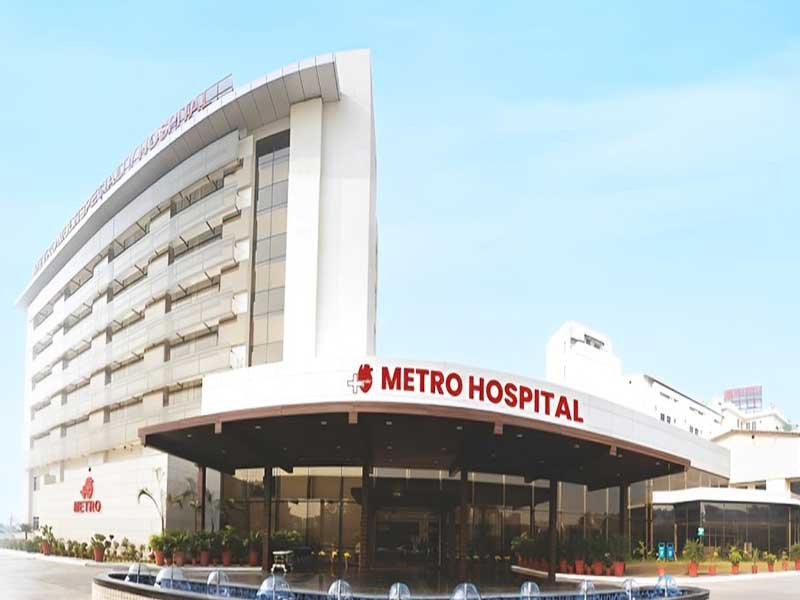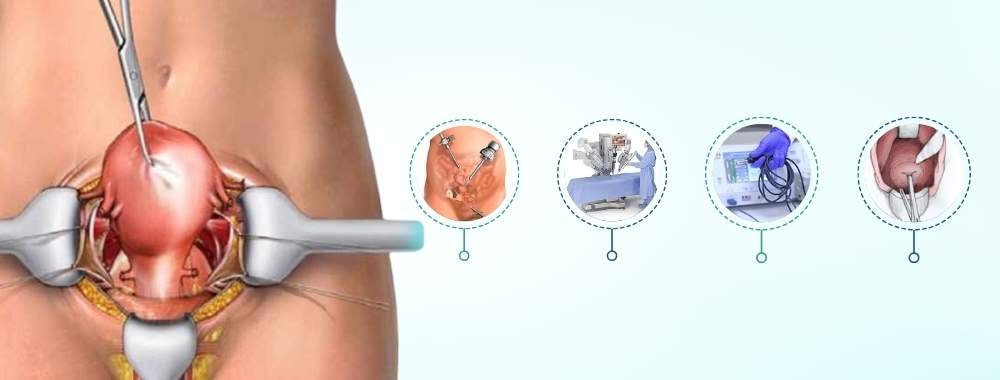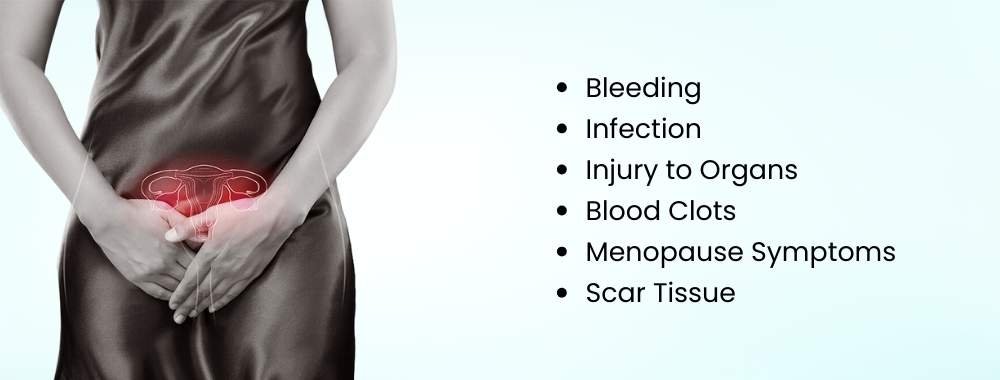Home Treatments Gynecology and Obstetrics Uterus Removal Surgery
Are you looking for a quality and affordable option for uterus removal surgery?
Uterus removal, or hysterectomy, is a surgical procedure that requires skilled surgeons and advanced techniques. However, finding high-quality medical care that is also affordable can be difficult.
India offers an ideal solution with experienced gynecologists, modern options like laparoscopic and robotic-assisted surgery, and accredited hospitals, India provides safe and precise care at an affordable cost as compared to Western countries.
Choose India for uterus removal surgery and benefit from trusted, high-quality medical services with advanced facilities.

There are several reasons why women might need a hysterectomy (uterus removal), including:
However, hysterectomy is a major surgery, and some conditions can be managed with medications or less invasive treatments, such as:
The cost of uterus removal surgery in India is significantly more affordable compared to that in Western countries, often at about half the price. This fee covers the entire surgical cost, the surgeon's fees, diagnostic tests, and rehabilitation if necessary.
Cost Component | Details | Estimated Cost in USD |
Pre-operative Consultation & Diagnosis | Consultations, X-rays, MRI scans, blood tests | |
Surgery Costs | Includes surgeon fees, type of surgery, and hospital stay | |
Rehabilitation and Follow-up | Physiotherapy sessions, medications, supportive devices, follow-up visits |

Several factors can influence the cost of uterus removal surgery in India, including:
Country | Cost Structure |
India | |
United States | |
Germany | |
Turkey |
◾ Key Takeaways
✅ Affordable Treatment Cost: Uterus removal surgery (hysterectomy) is affordable in India for international patients, offering quality care at a lower cost compared to many other countries.
✅ Advanced Medical Technology: Indian hospitals use the latest technologies in uterus removal surgery, ensuring precise and safe procedures for patients.
Uterus Removal Surgery cost
Treatment Name
Estimated Cost
Uterus Removal Surgery 3000-3400 USD
Beds: 539
New Delhi
Beds: 230
New Delhi
Beds: 710
New Delhi
Beds: 650
New Delhi
Beds: 191
New Delhi
Beds: 310
New Delhi
Beds: 299
Gurugram
Beds: 380
New Delhi
Beds: 402
New Delhi
Beds: 1300+
Gurugram
Beds: 1000
New Delhi
Beds: 450
Faridabad
Beds: 675
New Delhi
Beds: 500
New Delhi
Beds: 400+
Faridabad

Max Super Speciality Hospital, Saket

Aakash Healthcare Super Speciality Hospital

Indraprastha Apollo Hospital

BLK Max Super Speciality Hospital

Dharamshila Narayana Superspeciality Hospital

Fortis Escorts Heart Institute

Fortis Memorial Research Institute

Manipal Hospital Dwarka

Max Super Speciality Hospital Shalimar Bagh

Medanta - The Medicity Hospital

Moolchand Kharaiti Ram Hospital

Sarvodaya Hospital

Sir Ganga Ram Hospital

Venkateshwar Hospital

Metro Heart Institute with Multispecialty

Here are some of the latest technologies used in India for uterus removal surgery:
Necessary Diagnostic Tests
Before surgery, doctors will perform various tests to assess your condition and determine the best treatment plan. Tests include:
Tests | Description |
Pap Test | Also called cervical cytology, this test checks for abnormal cervical cells or cervical cancer. |
Endometrial Biopsy | A tissue sample is taken from the uterus lining to check for abnormal cells or endometrial cancer. |
Pelvic Ultrasound | This test shows the size of uterine fibroids, endometrial polyps, or ovarian cysts. |
Blood Tests | Blood tests help detect conditions like hormone imbalances that might affect surgery. |
Pelvic MRI | MRI uses a magnetic field to create detailed images of organs and tissues inside the pelvis. |
CT Scan of the Abdomen and Pelvis | This test uses X-rays to show cross-sectional images of the uterus and other pelvic structures. |
🟢Do’s Before Surgery
✅ Follow Your Doctor’s Instructions: Carefully follow your doctor’s advice on diet, medication, and any other guidelines.
✅ Complete Preoperative Tests: Make sure you complete all necessary tests, like blood work and imaging, to confirm you’re healthy enough for surgery.
✅ Quit Smoking: If you smoke, it’s best to stop, as it can interfere with recovery after surgery.
🔴Don’ts Before Surgery
❌ Don’t Eat or Drink Before Surgery: Follow your doctor’s fasting instructions, avoiding food and drinks 8 to 12 hours before surgery to prevent complications with anesthesia.
❌ Don’t Take Certain Medications: Avoid blood-thinning drugs, aspirin, or any medication not approved by your doctor, as these can increase risks during surgery.
❌ Don’t Use Alcohol or Tobacco: Avoid alcohol and tobacco for at least 24 hours before surgery, as they can interfere with anesthesia and increase complications.
Before Surgery
During Surgery
There are different ways to perform a hysterectomy, including:
After Surgery
Hospital Stay and Recovery

A hysterectomy, or removal of the uterus, is generally safe but may have some side effects, including:
Tests | Description |
Bleeding | There’s a small risk of heavy bleeding that may require a blood transfusion. |
Infection | A minor risk of infection may occur after surgery. |
Injury to Organs | There’s a chance of injury to nearby organs, like the bladder, intestines, ureters, blood vessels, or nerves. |
Blood Clots | Blood clots may form in the legs or lungs after surgery. |
Menopause Symptoms | If the ovaries are removed, menopause can start immediately, causing hot flashes, mood swings, vaginal dryness, and trouble sleeping. |
Scar Tissue | Scar tissue may form and cause abdominal tissues to stick together, leading to pain or digestive issues. |
Why Choose Mejocare for Uterus Removal Surgery in India?
✅ Team of Expert Gynecologists and Obstetricians: We recommend doctors with over 20 years of experience for the highest quality care.
✅ JCI/NABH Accredited Hospitals: Our partner hospitals are equipped with state-of-the-art facilities, including advanced technologies like robotics and diagnostic equipment, ensuring comprehensive and personalized treatment.
✅ Additional Services: Mejocare offers support for international patients, including medical visa assistance, airport transfers, hotel bookings, and 24/7 patient support. We also provide hospitalization assistance, local SIM cards, and fit-to-fly certificates for safe travel after treatment.
Uterus removal surgery provides several benefits such as relief from gynecological problems, endometriosis, fibroids, and irregular bleeding and it can also reduce the chances of cancer which includes developing ovarian, cervical, or uterine cancer. So, if you face any illness such as Abnormal uterine bleeding or pelvic inflammatory disease consult the doctor.

Medically Reviewed By
Dr. Aryan Malhotra is a highly respected and compassionate medical professional with a strong academic background. He holds an MBBS and MD degree from DTMU University in Georgia. Driven by a deep sense of duty, he is dedicated to providing exceptional care to his patients.
The average cost of Uterus Removal Surgery in India is between 3000-3400 USD.
The success rate of Uterus Removal Surgery in India is around 99%.
Most women spend 4-5 days in the hospital after Uterus Removal Surgery.
The recovery period after uterus removal surgery depends on several factors, such as the type of surgery, the patient's health, and the presence of any complications. Generally, it takes about six to eight weeks to fully recover from Uterus Removal Surgery. During this time, the patient should follow the doctor's instructions and avoid strenuous activities, lifting heavy objects, or sexual intercourse.
You run a higher chance of developing health issues if you have uterus removal surgery. However, if you take measures to eat a healthy diet, exercise frequently, and manage stress, you can live a healthy life after uterus removal surgery.
A uterus removal surgery can occasionally result in complications, just like any other kind of surgery. Among the potential issues are problems with general anesthesia, Harm to the ureter from bleeding, Infection or injury to the bladder or bowel, Clots in the blood, Issues with the genitalia, and Ovarian failure in early menopause.
Physical therapy for the pelvic floor is important before and after uterus removal surgery to prevent and cure any side effects that may arise from the procedure, such as lower abdominal pressure, discomfort, incontinence, or prolapse. Doctors advise a Pelvic Floor PT specialist who can assist you in addressing all these symptoms for this sort of physical therapy and in the case of pre-hysterectomy physical therapy, it may allow you to stop them entirely
Yes, it is necessary to have a companion.
Generally, it is advisable to wait at least six weeks after a hysterectomy before traveling by air or long distances by car, train, or bus. This is because traveling can increase the risk of blood clots, infection, bleeding, and other complications.
Yes, you can do your own research and choose your therapist.
Most patients find that the best post-operative pain management is a mix of NSAIDs (non-steroidal anti-inflammatory medicines), such as ibuprofen (Motrin or Advil), and narcotics, like Percocet.
Certainly, the cost of Uterus Removal Surgery in India is covered by insurance.
To discover the top doctors or hospitals in India, you can visit our website, mejocare on the doctors' page, you can filter and find the finest doctors, while on the hospital page, you can identify the best hospitals. Additionally, you can reach out to us, and we will gladly offer you all the necessary suggestions and information you need.
The procedure lasts one to three hours.
No, there is no waiting list for Uterus Removal Surgery in India.
Yes, you will likely need to undergo tests such as blood tests, Urine tests, Pelvic exam, Pap smear, Ultrasound, and Endometrial biopsy.
General anesthesia: This is when you are put to sleep and do not feel or remember anything during the surgery.
The average time to return to work after a hysterectomy is 8 weeks, but it can vary from 2 to 6 weeks depending on the individual circumstances. It is important to follow the surgeon's instructions and advice on wound care, pain management, physical activity, and sexual activity after the surgery.
Eat protein-rich foods, such as lean meat, fish, eggs, dairy products, beans, and nuts. Protein helps repair tissues and wounds after surgery. Eat fruits and vegetables, which provide vitamins, minerals, and fiber. Fiber can help prevent constipation, which is a common problem after surgery and anesthesia. Eat whole grains, such as brown rice, quinoa, and whole wheat bread. Whole grains provide energy and prevent blood sugar fluctuations. Eat healthy fats, such as avocado, olive oil, and nuts. Healthy fats can reduce inflammation and support hormone production. Avoid processed and high-fat foods, such as fast food, fried food, and pastries. These foods can increase inflammation and slow down the healing process. Avoid alcohol and caffeine, which can interfere with sleep and hydration. Drink plenty of water and other fluids to stay hydrated. Avoid sugary foods and drinks, such as candy, soda, and juice. These foods can cause blood sugar spikes and crashes. Avoid spicy and acidic foods, such as chili, tomato sauce, and citrus fruits. These foods can irritate the digestive system and cause discomfort.
Aftercare services provided by the hospital include Monitoring vitals, Wound care, Managing post-operative complications, Rehabilitation services, and Follow-up.
Our care team can help you.
